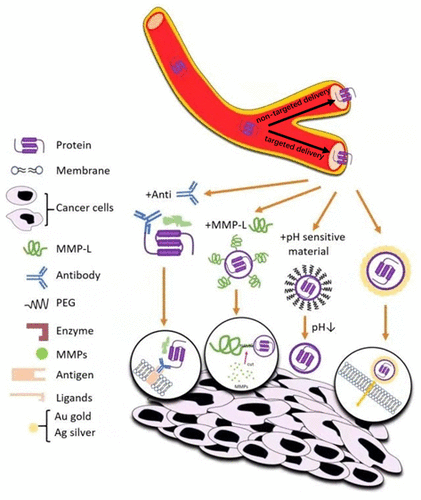当前位置:
X-MOL 学术
›
ACS Pharmacol. Transl. Sci.
›
论文详情
Our official English website, www.x-mol.net, welcomes your
feedback! (Note: you will need to create a separate account there.)
Advances on Tumor-Targeting Delivery of Cytotoxic Proteins
ACS Pharmacology & Translational Science ( IF 4.9 ) Pub Date : 2019-12-30 , DOI: 10.1021/acsptsci.9b00087 Akmal M. Asrorov 1, 2 , Zeyun Gu 1 , Kyoung Ah Min 3 , Meong Cheol Shin 4 , Yongzhuo Huang 1
ACS Pharmacology & Translational Science ( IF 4.9 ) Pub Date : 2019-12-30 , DOI: 10.1021/acsptsci.9b00087 Akmal M. Asrorov 1, 2 , Zeyun Gu 1 , Kyoung Ah Min 3 , Meong Cheol Shin 4 , Yongzhuo Huang 1
Affiliation

|
Great attention has been paid to cytotoxic proteins (e.g., ribosome-inactivating proteins, RIPs) possessing high anticancer activities; unlike small drugs, cytotoxic proteins can effectively retain inside the cells and avoid drug efflux mediated by multidrug resistance transporters due to the large-size effect. However, the clinical translation of these proteins is severely limited because of various biobarriers that hamper their effective delivery to tumor cells. Hence, in order to overcome these barriers, many smart drug delivery systems (DDS) have been developed. In this review, we will introduce two representative type I RIPs, trichosanthin (TCS) and gelonin (Gel), and overview the major biobarriers for protein-based cancer therapy. Finally, we outline advances on the development of smart DDS for effective delivery of these cytotoxic proteins for various applications in cancer treatment.
中文翻译:

肿瘤靶向递送细胞毒性蛋白的研究进展
已经高度关注具有高抗癌活性的细胞毒性蛋白(例如,核糖体失活蛋白,RIP)。与小型药物不同,细胞毒性蛋白可以有效地保留在细胞内,并避免由于多重效应而由多药耐药转运蛋白介导的药物外排。然而,由于各种生物屏障阻碍了它们向肿瘤细胞的有效传递,因此这些蛋白质的临床翻译受到严格限制。因此,为了克服这些障碍,已经开发了许多智能药物输送系统(DDS)。在这篇综述中,我们将介绍两种代表性的I型RIP,天花粉蛋白(TCS)和明胶蛋白(Gel),并概述基于蛋白质的癌症治疗的主要生物屏障。最后,
更新日期:2019-12-31
中文翻译:

肿瘤靶向递送细胞毒性蛋白的研究进展
已经高度关注具有高抗癌活性的细胞毒性蛋白(例如,核糖体失活蛋白,RIP)。与小型药物不同,细胞毒性蛋白可以有效地保留在细胞内,并避免由于多重效应而由多药耐药转运蛋白介导的药物外排。然而,由于各种生物屏障阻碍了它们向肿瘤细胞的有效传递,因此这些蛋白质的临床翻译受到严格限制。因此,为了克服这些障碍,已经开发了许多智能药物输送系统(DDS)。在这篇综述中,我们将介绍两种代表性的I型RIP,天花粉蛋白(TCS)和明胶蛋白(Gel),并概述基于蛋白质的癌症治疗的主要生物屏障。最后,











































 京公网安备 11010802027423号
京公网安备 11010802027423号